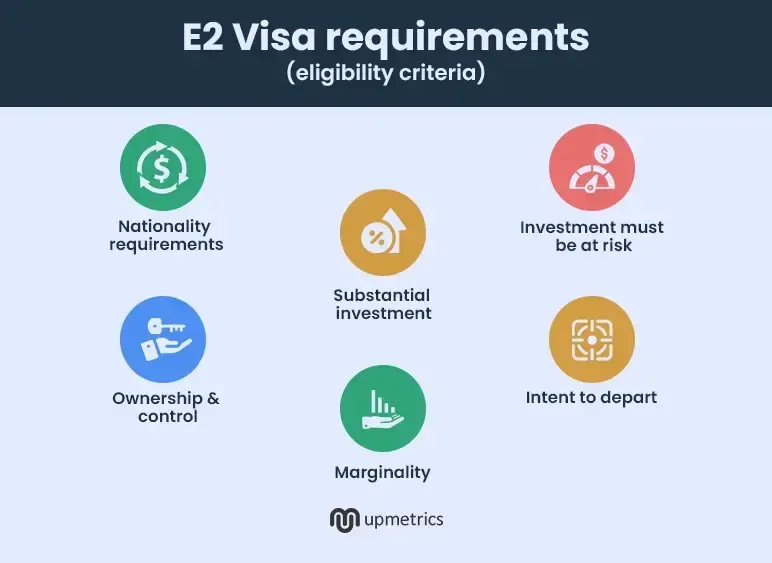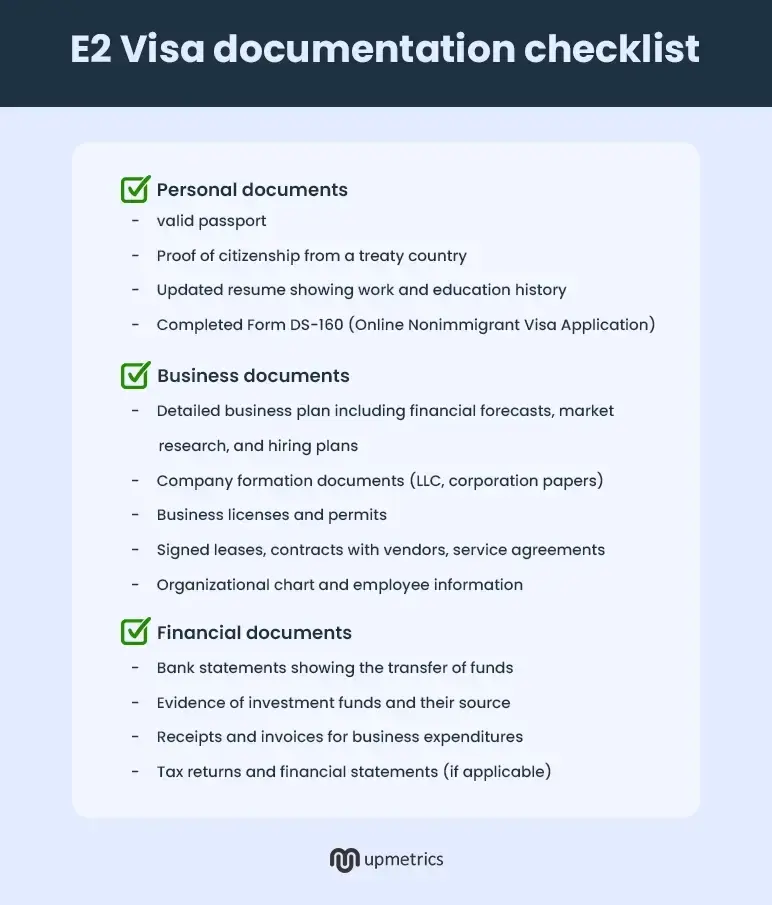If you’re planning to enter the U.S. to invest in and manage a business, the E2 visa could be your best route.
It allows citizens of certain countries (i.e., treaty countries) to live and work in the U.S. based on a business investment. But the E2 visa comes with strict rules!
You’ll need to meet every requirement clearly if you want your application approved.
In this post, we’ll walk you through the full list of E2 visa requirements and everything you need to know in simple terms.
E2 Visa requirements (eligibility criteria)
Here’s a clear breakdown of what you must meet to qualify.

1) Nationality requirements
You must be a citizen of a country that has an active E-2 treaty with the United States.
Residency or work permits from those countries are not enough. Your passport matters, not your address.
Example:
If you have an Australian passport, you’re eligible.
If you only live in Australia but hold a Chinese passport, you’re not eligible—China does not have an E-2 treaty.
See the list of treaty countries.
2) Substantial investment
You must invest a substantial amount of capital in the U.S. business. There’s no official dollar amount written in the law, but real-world cases show:
- $100,000–$150,000 or more is considered strong
- For low-cost businesses (like consulting firms), less could be accepted if justified
The investment must be large enough to get the business off the ground and running.
3) Investment must be at risk
Your money must be actively invested and at real risk. It means you must commit it to the business, and it must be subject to total or partial loss if the business fails.
What counts:
- Signing a lease for your business office or shop
- Buying inventory, equipment, or supplies
- Paying for business marketing or website development
- Hiring employees and paying their salaries
What does not count:
- Simply putting money into a savings account
- Just showing a promise to invest
Note: Funds held in escrow (pending visa approval) may be acceptable if conditions are clear and legal.
4) Ownership & control
You must own at least 50% of the enterprise or business. You must also direct and develop the company, meaning you’re actively involved in decisions and daily operations.
Passive investors who just put in money but do nothing to run the business don’t qualify.
5) Marginality
Your business must not be “marginal.”
A marginal business is one that only earns enough to support you personally, without growing or creating jobs.
Alternatively, it should have a significant economic impact in the U.S., such as:
- Create jobs for U.S. workers
- Have strong plans to grow over time and make a profit beyond the personal salary
6) Intent to depart
You must promise that you intend to leave the U.S. when your E-2 status ends.
You don’t need a flight ticket booked or a written departure plan—you just need to convince the visa officer that you respect U.S. immigration rules and won’t overstay illegally.
E2 Visa documentation checklist
Having strong documents makes or breaks your case. Here’s what you’ll need:

1. Personal documents
- Valid passport
- Proof of citizenship from a treaty country
- Updated resume showing work and education history
- Completed Form DS-160 (Online Nonimmigrant Visa Application)
2. Business documents
- Detailed business plan including financial forecasts, market research, and hiring plans
- Company formation documents (LLC, corporation papers)
- Business licenses and permits
- Signed leases, contracts with vendors, service agreements
- Organizational chart and employee information
3. Financial documents
- Bank statements showing the transfer of funds
- Evidence of investment funds and their source
- Receipts and invoices for business expenditures
- Tax returns and financial statements (if applicable)
The bottom line
The E-2 visa is one of the most flexible U.S. visa options for treaty-country entrepreneurs and investors to live in the United States and build a real business.
What matters most is: The government wants to see that your business is real, your investment is committed, and your plans are well thought out.
So, follow the rules closely, present a clear case, and get professional immigration attorney guidance if needed, and you’ll enhance the likelihood of a successful application.


